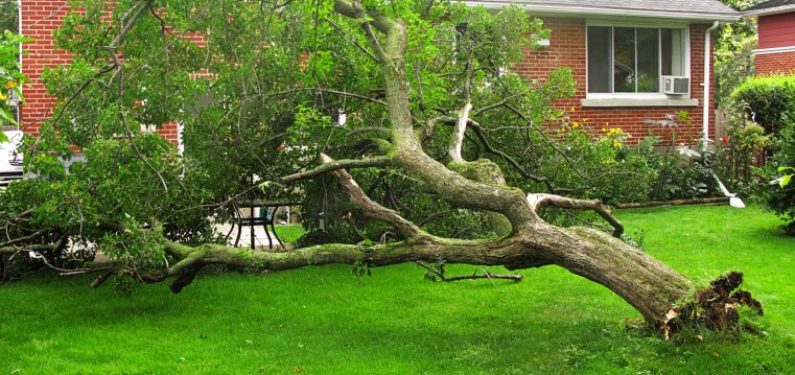
TIMBER! Falling Trees and Insurance
July 22, 2021Severe weather goes hand in hand with damage from falling trees and limbs. Every season has its weather concerns, but summer is known for severe weather complete with lightning, heavy rain, and high winds. After a severe thunderstorm, there are always reports of downed trees either from breaking off or being uprooted. Depending on where they are located, they pose a potential loss of property; be it buildings, trucks and autos, or other miscellaneous types of property. Here’s what you need to know about falling trees and insurance and how damage from them may be covered on your insurance policies:
Scenario #1 – A Tree Falls in Your Yard With No Resulting Property Damage
We will start with the simple situation of a lone tree coming down in the open and hitting no other objects as it falls. Now, your beautiful shade tree is a big tangled mess in the backyard!
If there is no property damage caused to buildings by the tree, there is no claim to be paid from that standpoint. You have may have lost the shade provided by that tree, but that is not a covered loss.
Scenario #2 – A Tree Falls on Your Car Parked in the Driveway
What happens if a tree falls and lands on your car parked in the driveway? Your car’s roof is dented and the windshield is broken. What pays to fix the car?
That damage is paid by your auto policy under Comprehensive Coverage, or Other than Collision (OTC.) But, you must have Comprehensive or OTC listed on your policy for that vehicle.
In this case, you would be responsible to pay your deductible. You could also be responsible for the cleanup of the tree as well. Cleanup of the tree would be paid only if the tree is blocking the entrance to your property, such as your driveway or the front door to your home.
Scenario #3 – A Tree Falls on a Guest’s Car Parked in Your Driveway
If you have guests over at the time of the storm and the tree falls on their vehicle, their auto insurance policy will be where they look to have coverage for the damage to their auto.
It will not be paid by your homeowner policy. The reasoning behind your homeowner policy not paying is because you did not do anything negligent to cause the tree to fall.
Scenario #4 – A Tree Falls and Damages Your Home
The next scenario is when a tree falls and strikes and damages your dwelling; damages the roof, rips the spouting off, etc. In this case, your homeowner policy will pay for the damage to the structure and any personal property. Again, you will have your deductible to pay.
If the tree is laying on the house, the policy will pay to remove the tree off of your home. If the tree is not on your house, the policy will pay very little or nothing to remove the tree. If the tree rolls off of the house and blocks your driveway or the front door, the policy will then pay to remove the tree.
Scenario #5 – A Tree Falls and Damages Your Fence
What about if a tree falls on your pool fence, your privacy fence, or the fence around your yard? The fence would be covered for damage from the tree provided your policy has a limit listed for “Other Structures.”
Most homeowner policies have a limit for these structures listed. If you have a Farmowner Policy, you may not have a limit on the policy for “Other Structures”, depending on how you have insured outbuildings on your property.
Again, the removal of the tree would be covered if the tree is still on the fence. As a note, if you have fencing that stretches hundreds of feet, say for a paddock for your personal horse, it is very doubtful that your insurance policy will provide any coverage for that fence being damaged by a falling tree.
Scenario #6 – A Tree Falls and Damages Your Neighbor’s Property
What if your tree is right on the property line and it is blown down and lands on your neighbors dwelling or utility shed? In this case, your neighbor’s homeowner policy would respond to the damage caused to their property. And, ultimately, your neighbor would be responsible to clean up any debris on their side of the property line.
You may wish to be neighborly and work together to clean up the mess. After all, the next storm may come from the opposite direction and blow their tree down on your property! The only way you would have any reason or chance for your neighbor to collect against you or vice versa would be if the damaged party could prove negligence in maintaining a dead or dying tree.
Trees add beauty to your property and provide much-needed shade in the dog days of summer. But, trees, like all property, need to be properly maintained, especially when it comes to falling trees and insurance.
Perhaps one of the best options to alleviate the potential damage from falling trees and branches is to keep your trees properly trimmed to reduce wind pressure and keep compromised limbs and branches removed. But, please hire a professional tree surgeon to do that job. It is very dangerous and has the potential to cause great injury!
Falling trees and insurance can be simple or complicated depending on the damage caused and other circumstances. If you have additional questions, please call one of our knowledgeable agents and we can discuss your particular situation. We can be reached at 800-537-6880 or 717-665-2283.
Disclaimer: Information and claims presented in this content are meant for informative, illustrative purposes and should not be considered legally binding.

